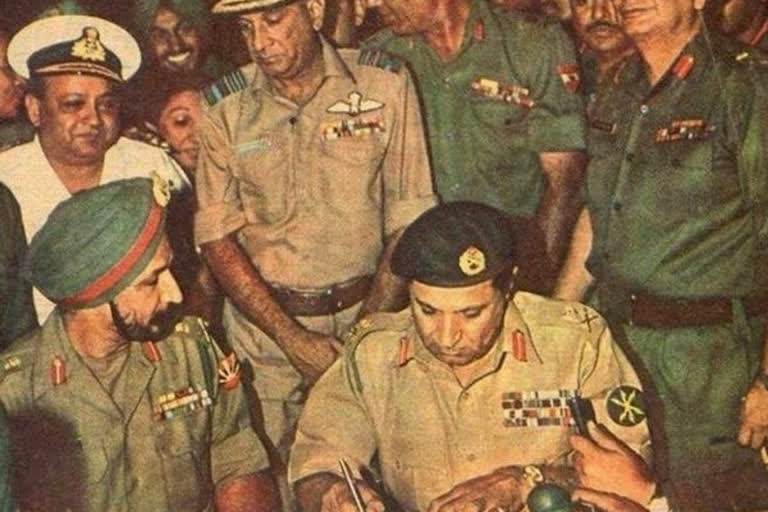Dehradun: The nation is commemorating India's triumph over Pakistan in the 1971 Bangladesh liberation war on Friday by celebrating Vijay Diwas. India declared victory on December 16, 51 years ago after Pakistan signed the Instrument of Surrender, following a 13-day India-Pakistan war. With the surrender of over 93,000 soldiers, Pakistan Army's capitulation against Indian forces was complete. Following this decisive victory, India announced itself as a major regional force.
The catalyst of the conflict was the struggle of the Bangladeshi people for independence, West Pakistan's mistreatment of the Bangladeshi masses and the subversion of the outcomes of the elections in East Pakistan. The extensive genocide of the East Pakistani people committed by the authoritarian military government of Pakistan, led by General Yahya Khan, was another reason for the conflict. East Pakistan made the formal request for succession on March 26, 1971.
On December 3, 1971, Pakistan launched preventive airstrikes against 11 stations of the Indian Air Force. In all, thirty-two aircraft out of an inventory of 278 fighter planes took part in the initial strike that started between 5:09 pm and 5:23 pm, but was not successful. Following this, the Indian Army was ordered to aid Bengali nationalist organisations in their fight for Bangladeshi independence in East Pakistan.
During his interrogation in India after the war, Lt Gen AAK Niazi said that Pakistan's strategy was centred on the premise that India had 'planned only a limited action' for establishing Bangladesh Government in East Pakistan. On the basis of this assessment, Pakistan deployed her forces thinly all along the border spread out over twenty-five hundred miles and ordered them to hold on at any cost. As a result, Pakistani troops were pinned down at the periphery. This enabled the Mukti Bahini to expand their sway inside East Pakistan. In reality, the Indian objective was not capturing a chunk of territory, but by the time this was realised, it was, too, late for Pakistan to rectify its strategic mistake.
The Mukti Bahini insurgents in East Pakistan teamed up with Indian forces to combat Pakistani troops in the region. The Southern Command protected the nation's borders during the conflict from Pakistani aggression. The legendary battles of Longewala and Parbat Ali are among the conflicts fought in the Southern Army's operational region. Here, tenacious Indian troops decimated Pakistan's armoured forces.
India began Operation Trident on December 4, 1971. The Western Naval Command of the Indian Navy successfully launched a surprise attack on Karachi harbour during this operation. Trident served as the cover name for it. A raid was conducted on the Pakistani town of Chachro by members of the legendary 10 Para Commando Battalion under the command of Lieutenant Colonel (later Brigadier) Bhawani Singh. These fights have made history and demonstrate the tenacity, bravery and determination of our men.
Also read: Remembering Bhagat Singh, India's greatest revolutionary on his 91st death anniversary
A meeting with the Governor of East Pakistan was taking place in a home on December 14 when the IAF struck the location. This strike left Pakistan reeling. Because of this, on December 16, 1971, the process of surrender began. Dacca fell without a fight even though barely twenty-four hours earlier Niazi had defiantly told BBC that the army would fight to the last man. However, instead of any heroics, Niazi surrendered to the Indian army on December 16 and tamely signed the Instrument of Surrender in a formal public ceremony. East Pakistan separated from Pakistan on December 16, 1971, and Bangladesh was born as a new country.
The people of Pakistan heard the news of the surrender on December 16 through the Indian Prime Minister's broadcast over All India Radio. The announcement of surrender was soft-pedalled by Radio Pakistan in its 5 pm news bulletin in these memorable words: 'Following an arrangement between the commanders of India and Pakistan, fighting has ceased in the Eastern theatre and the Indian troops have entered Dacca.'
Pakistan and the creation of Bangladesh was a devastating event for West Pakistan, the aftershocks of which continue to this day. Along with the physical fall of Dacca, Pakistan was also defeated psychologically. The two-nation theory, that Muslims of the subcontinent formed a nation, was demolished. Pakistan is still searching for a rationale for the dismemberment of India, this battle is considered a historical occurrence. Because of this, December 16 is commemorated nationwide as Vijay Diwas to honour India's triumph over Pakistan. (With Agency Inputs)



